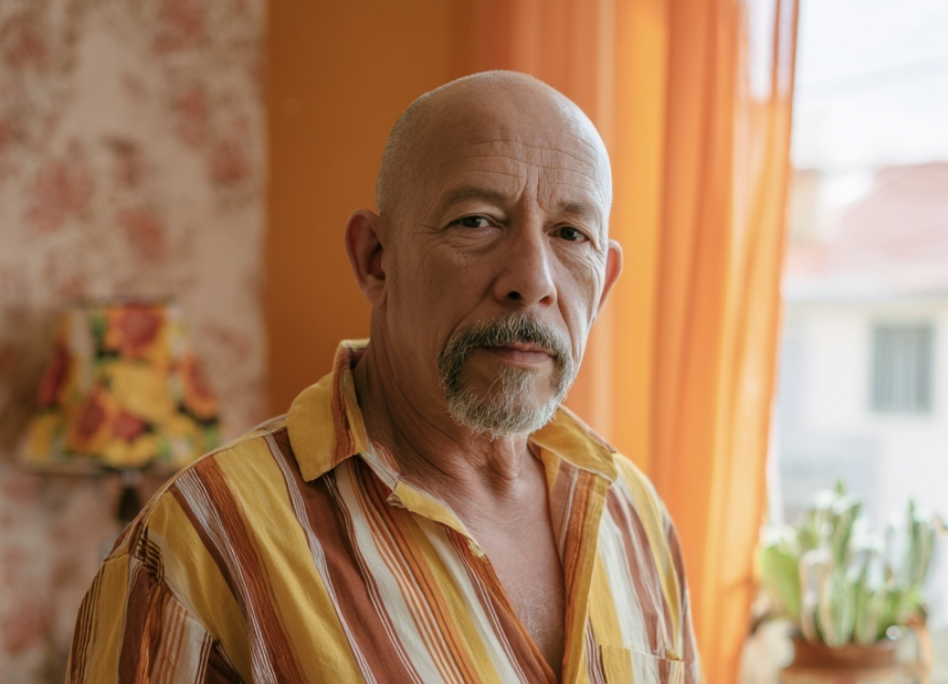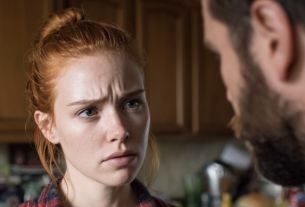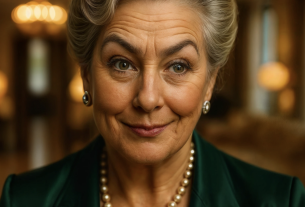Lida, startled, dropped the glass jar she was washing. The jar shattered on the floor, scattering shards everywhere, and Zoya squealed, crouching down in fright.
“Quiet, girls! No scandals in my house! You both carry my children, so carry them!”
Grandma Manya had come in from the yard, catching the scene in full swing.
“The old devil’s completely lost his mind — brought another wife into the house!”
Grandma Manya grabbed her grown son by the hair. Nikolai grunted but stayed silent. He never argued with his mother — he knew she would scold him, then calm down, same as always.
“Mother, please, calm down!”
“I’ll calm down when I’m dead! You’ve made the whole village laugh at us — turned my house into a harem, a sultan without trousers!”
“Don’t make a scene, Mother.”
“And what are you thinking about, eh? You’ve knocked the girl up! How old is she? What’s she going to do with you, an old geezer?”
“Let her give birth!”
“Of course, let her give birth! This is no longer a house, it’s a travelling maternity ward! Bring in another one while you’re at it! Devil you are — I don’t know what women see in you.”
Grandma Manya stormed into the kitchen. Harem or not, everyone still needed to eat. She had grown smaller with age, her face deeply wrinkled, but she hadn’t lost her spark — especially since, it seemed, God was sending her grandchildren in batches.
From then on, the whole village called them “Kolya’s harem.” The women’s due dates were almost the same, so they waddled around the house like ducks in a row. Nikolai stayed home more often, or took odd jobs. For all his womanizing, he wasn’t a drunk — and he worked hard.
You might wonder how Nikolai’s wife and Zoya managed to live under the same roof. Well, they did — tolerably. Grandma Manya, though she scolded her son, accepted her second daughter-in-law. What else could she do? When the belly is already out front, it’s too late to flap your wings. At first the women didn’t talk at all, but later they began to exchange words.
Lida still held a deep grudge against her husband and often complained to Grandma Manya.
“Mother, why would he do this to me? He’s always cheated, and now he’s having another woman’s child. What have I done to deserve this?”
“Nothing, daughter. My son’s just no good. I had him out of wedlock myself — from a Gypsy man. The camp was by the river, and I fell in love. Thought I’d go mad from it.”
“And Grandpa?”
“Ivan took me in pregnant, gave the boy his name, loved me dearly, never reproached me once.”
“And the Gypsy?”
“Oh, he was like tumbleweed — but handsome, and could sing like no one else. Now I just remember… and look at this parasite here, Kolya.”
“So that’s why he’s such a womanizer.”
“Yes. Blood will tell. Forget him, daughter. You’ll give birth soon — you can’t be upsetting yourself.”
After that talk, Lida calmed down a bit and even stopped glaring at Zoya.
Zoya herself wasn’t sure whether to be glad that Nikolai had brought her into the house. She was kind of “with a man,” but not really a wife. Still, she managed, helping Grandma Manya and sometimes cooking.
In due time, Lidia gave birth to a daughter. Since her first children had all been sons, everyone was delighted with little Annushka — especially Nikolai, as she was his only daughter, a late and precious child. Grandma Manya was overjoyed to finally have a girl in the family.
The birth had been hard on Lida — her age had taken its toll — but she smiled blissfully, gazing at her baby’s sweet face. A late child, but a daughter — perhaps it had all been meant to be.
Zoya still had about three weeks to go. Being young, she carried her pregnancy easily. But one evening, when the house had quieted, a terrible scream came from Zoya’s room.
No one knew what had triggered such sudden labor. They didn’t manage to get her to the hospital — Grandma Manya and Nikolai ended up delivering a boy right there at home. He cried loudly from the start, declaring his right to live. But Zoya began to hemorrhage, and by the time they reached the city from the village, it was too late. She didn’t survive.
During the days of the funeral, Nikolai’s face turned dark. At Zoya’s grave, he wept quietly. At home, a newborn son waited for him — a son without a mother.
All care for the boy fell on Nikolai and old Grandma Manya. But the baby fed poorly and was always fussy. The doctor said he was probably allergic to cow’s milk and needed special formula close to breast milk in composition.
Nikolai had no idea where to get it, so he knelt before Lida.
“Lidushka, help me. Feed the boy. Don’t let him die — you have so much milk.”
“I won’t. What’s he to me?”
“Please, Lida.”
“I won’t.”
“He’ll die!”
“Let him die, what’s it to me?”
“Lida, have pity — listen to him cry!”
“I won’t feed Zoya’s son!”
“But he’s mine too!”
“That’s exactly why I won’t!”
Lida walked into her room and slammed the door.
Nikolai came to her several more times with the boy, but she wouldn’t relent. The baby cried all day until he was hoarse. In just a few days, he had grown noticeably thinner. He had been small at birth, and now he was simply wasting away.
Grandma Manya didn’t interfere — she understood Lida, but hoped Nikolai would find a way. Still, she felt sorry for the boy. Goat’s milk didn’t suit him either.
The child no longer cried, just whimpered weakly, when Lida finally came into the room.
“Give me the brat.”
Nikolai jumped up, hardly believing his ears, and handed her the baby.
“Lidushka…”
“He’s skin and bones — you’ve starved him!”
She put the baby to her breast. He whimpered softly, then began to suck.
“Thank God,” whispered Grandma Manya in her room.
From then on, Lida nursed two babies. The boy quickly grew stronger and even outpaced his sister. By fate’s twist, Lida ended up with two children — though she hadn’t planned for even one more.
The village women gossiped about the family, pitying both Lida and Zoya. But the children grew anyway — that’s a child’s job, to grow no matter what.
Grandma Manya was happy for them but passed away when the children were six. She died quietly in her sleep, just as she had wished.
Annushka was the image of Lida — red-haired and freckled. Kolya took after his father — dark, big, striking. He was a gentle boy, and Lida grew to love him despite herself. He called her “Mama.” At first she protested, but later she let it go — after all, she had fed him with her own milk.
The elder Kolya adored the younger two, doting on them more than he had on his older children.
He passed away when the children were fifteen. A healthy, strong man who could have lived many more years — but it seemed a blood clot had claimed him.
Lidia still lives in the village. She has aged, of course, but is in good health. Annushka moved to the city, while Nikolai stayed with her. He married, brought his wife into the house, and now Lidia has taken Grandma Manya’s place.
Nikolai works and resembles his father — big, handsome. His wife, Masha, is small and gentle. They’ve had three children in quick succession — two sons and a daughter. They plan to build a house, but for now it’s just a plan.
Nikolai knows the whole story of his birth. He’s put up a beautiful monument for his mother Zoya and for Nikolai, and he loves and helps Mama Lida dearly.
There had been both judgment and sympathy toward them over the years, but time washed it all away. Now there is a wonderful family with three children. Life goes on — and perhaps that’s the most important thing.



